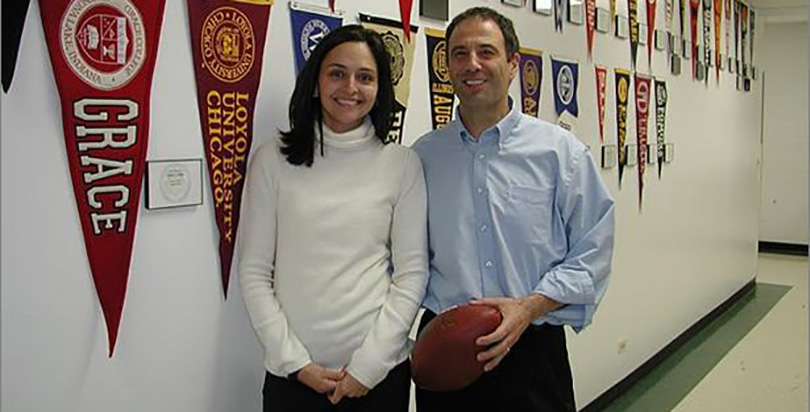On Leadership: Mike & Tonya Milkie raising the bar for 11k High-Needs Chicago Students at Noble Network

This is the final installment in a three-part series The Seventy Four is publishing this week recognizing extraordinary school leaders to mark the end of National Principal’s Month. This Q&A has been edited for style and length.
Soulmates. Co-founders.
Back in the late 1990s, it was love in the time of startups for Mike and Tonya Milkie.
In Fall 1999, the two educators launched a public charter high school together. Noble Street Prep in Chicago, their first campus, would expand into a network that now serves 11,000 high-needs high school students across 16 campuses in the Windy City. On Wednesday, it was announced that a 17th school was being added to the Noble network.
The Milkies have thousands of kids on wait lists for Noble. Not to mention that they now have two kids of their own.
“We had the confidence that we could figure it out,” says Tonya Milkie, reflecting on their early days as teacher-entrepreneurs brainstorming how to turn their vision into reality.
And figure it out they did, though they remain both humble and striving. Noble is making college a reality for low-income students at rates that far exceed both national and district averages.
With graduation and college-going enrollment rates of 90 percent — and a dropout rate of only .3 percent — serving a population of students who are 89 percent low income, Noble has proved its relentless focus on results getting results.
Last year, The Broad Foundation named it the top public charter school system in America.
Though the network has expanded and proven its worth, you will find Mike and Tonya literally in the same place they were 15 years ago: Room 207 on the original Noble campus, the office where they both work.
“We never changed offices because we didn’t want to lose touch with what we started our work for,” says Mike.
Add another shared label to the list: officemates.
You are cofounders of two organizations: a public charter network of 11,000 students and a family of four. How did you meet?
Mike: We met when I was a teacher and Tonya was an admissions counselor with DePaul University. I was working with high school seniors and trying to get them scholarships for college, especially DePaul, so I was really trying to work the admissions team. And that included Tonya. In the process, I guess I worked her (into liking me) too … I got to know her and that’s how we met.
Tonya: That’s the same story I would tell. Verbatim.
It’s clear you share a passion for serving the neediest students. How did Noble get off the ground?
Tonya: At that time (the mid-1990s) in Chicago, the ed reform movement was alive and well. We had some teachers on staff at Harper High School (where Tonya was working) who were very involved in it. Especially in the small schools movement, an effort to take large schools and break them into smaller schools within a school building.
There were two principals at Harper during this time and they were very supportive of the small schools idea so we said, ‘Let’s try this … a small school with more of a family feel, a tighter culture, more of an identity and some loosening of other restrictions or rules that the general school had in place.’
There were four of these schools that developed within my high school and definitely showed some positive results in terms of attendance and academic performance. Two of the founders of those schools left Harper to start a charter school in the first round of charters that were issued in Illinois.
What drew you to the public charter school model?
Tonya: Charters mimicked a lot of what we were able to do in our small schools at Harper. It was the idea of being able to have autonomy over a lot of things that we felt like were going to be important to our success.
Mike: We applied in Fall 1997 to open in 1998…In December we found out we didn’t get approved actually. But we were resilient and we actually then went back on appeal and our application ended up being approved. We opened in Fall 1999….One salient point here is I would have never heard about charters if I had not been with Tonya. That’s how I learned about them. And she from Harper, her school.
What are Noble’s core values?
Mike: We have five. Results, Respect, Follow Through, Diversity of Perspective, Humility.
This is what we really try to live as we operate. Results is first for a reason. We’re constantly saying, ‘How can we have better outcomes for our students?’ While all of the values are important, we never want to forget that feeling good about ourselves isn’t enough. We have to have great results.
As you’ve expanded to serve more students, what aspects of your mission and vision have you held on to the tightest?
Tonya: I think culture is the thing we’ve held onto the tightest. We always knew it would be central. We wanted to be a school where for the teachers who are working in our buildings, their classrooms are sacred. We wanted them to be focused on teaching and getting better at teaching and reaching the kids who are struggling and to have our full support so that they could focus on teaching. And when they needed us to be available and resourceful, we would be there to problem solve. I would say that culture is even stronger today than it was in 1999. That is the thing that we’ve been unwavering about. We’ve even gotten better about it as we’ve expanded. All of our teachers work very hard … the things that we can take off their plates and the ways that we can protect their classrooms — we do.
Feedback is so important to continuous improvement. How do you think about it? How do you give it?
Tonya: We talk about feedback and how to give it and why it’s awkward and try to make it a positive. We work with a staff of people who are really good at what they do. But no one’s perfect. So we try to come at it from a perspective of for each of us, what do we want to get better at? If it’s not your strength it doesn’t necessarily mean it’s a weakness. It’s important to define growth…and then work with one another towards it.
Mike: We certainly, as a network, have focused on making feedback part of our regular course of action. We’re constantly serving staff, we’re constantly providing forums with us as management to get information that can help us make teaching and outcomes for students better. A lot of great charter organizations do this — provide an atmosphere that allows for feedback at all levels.
What’s in the future for Noble? Have you thought about geographic expansion?
Mike: Serving more students and having a positive impact on the Chicago Public School system. Part of that is growth and part of that is even greater quality. Expansion … we’ve thought about it and we’ve had many cities that have talked to us about expansion. But we believe that Chicago has a great need and we’re poised to be able to be part of continued improvement in Chicago Public Schools.
What has been hard?
Mike: Bureaucracy, in general, is frustrating. One of the reasons we began a public charter school was to leave the bureaucracy in the district. But unfortunately you can’t leave it completely. There’s still a myriad of federal, state and district bureaucracies that we have to go through to get things done. The amount of time that we spend on advocacy because people “oppose us”… we are forced to divert resources to what I think is a pretty self-evident situation of parents choosing that this a great option for their child. But it doesn’t seem to be enough, so we have to do a lot of organizing of our parents so their voice is heard.
Shifting gears a little bit, what do you consider to be each other’s biggest strengths?
Mike: I think Tonya’s greatest strengths are two things. Execution. In those early years, and one of the things we pride ourselves on at Noble in general, is getting things done. Following tasks through to completion. That’s one of the things Tonya is especially good at. And then the second thing: I think that she sees land mines really well that I probably wouldn’t … Seeing around the curve is one of her strengths.
Tonya: I think for Mike it’s he doesn’t get rattled really by anything. We’re sort of opposites in that way which helps. He stays the course, even when things get interesting. I think that’s especially true in the role of principal where any small thing can become very big to a parent or a student. Mike stays very steady and very positive. And that’s definitely translated to the bigger stage of having to be in the political arena a lot.
Mike: And those same qualities apply in our parenting also.
Get stories like these delivered straight to your inbox. Sign up for The 74 Newsletter

;)
